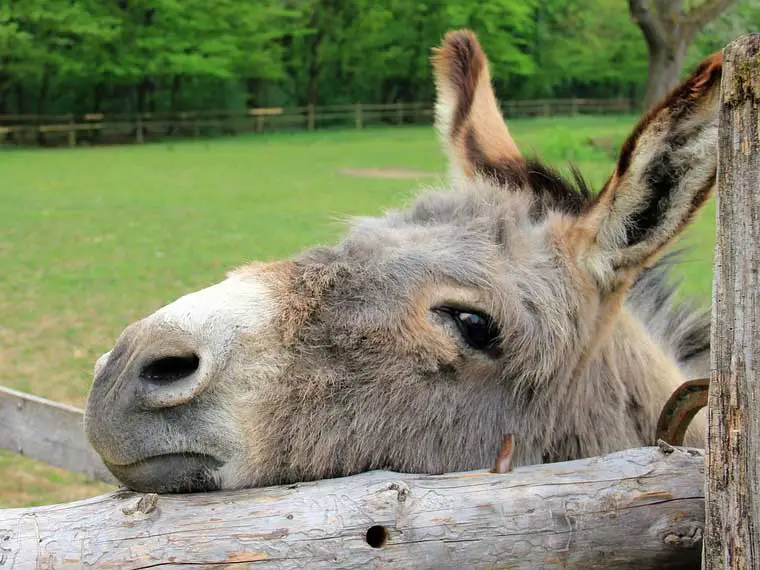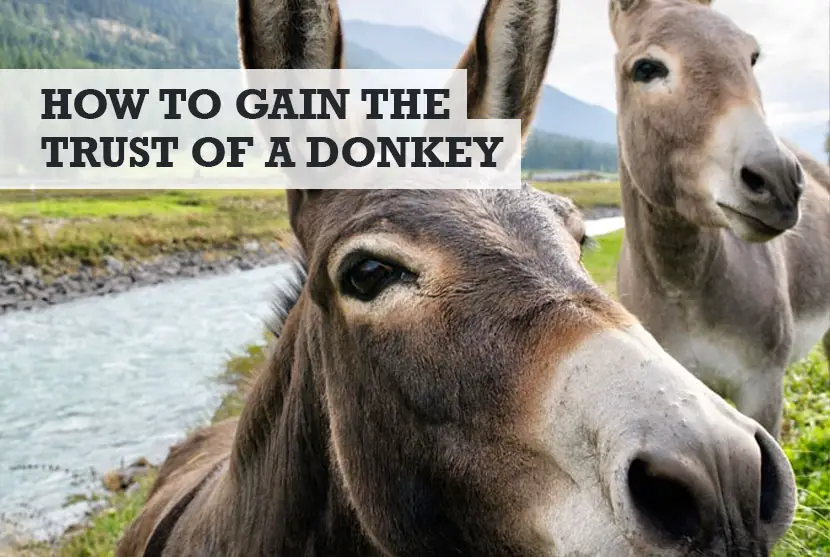Donkeys can be faithful animals if treated the right way. And of course, this means gaining their trust. In order to get a donkey to trust you, you need to be trustworthy yourself. Donkeys are stoic and have long memories. You need to play an equally long game.
It will take time for your donkey to start trusting you. By developing routines and a calm demeanour, you can usually win the trust of most animals, especially those that might have a history of trauma and abuse – rescue donkeys being the obvious case in point here.
Sometimes it pays to let the donkey take the lead in developing a relationship. They are curious creatures and if they sense you mean them no harm, they will more than likely approach you.

Why your donkey doesn’t trust you
In the ideal world, all donkeys are treated well. The sad reality is that many of them are subjected to overwork, neglect and, in worse cases, physical abuse.
For example, the World Animal Foundation say this about donkeys:
“In many societies donkeys are regarded as low status animals and are commonly mistreated. They are forced to perform more work than their small bodies can handle. Since new donkeys are cheaper than veterinary care, ill and injured donkeys are often tied to posts without food or water and left to die.”
And the Vegan Peace website also make a good a point about why donkeys don’t always trust humans:
“In a lot of countries donkeys are used as working animals. Since a new donkey is often cheaper than veterinary care, sick or injured donkeys are often tied to posts without food or water and left to die. It is also very common for stray donkeys to get severely abused just for fun.”
But what about donkeys who have not been abused, why might they lack trust in you? Well, unless they are used to humans, they will be naturally scared. Often they will show their teeth to warn you away.
More about the mistreatment side though, and how this can mean it’s hard to get a donkey to trust you.

Why donkeys might lack in trust
Donkeys can live for 40 years. Many of them have seen dramatic changes in their lifetimes. Worldwide there has been a decline in the need for the services that these beasts of burden can offer.
Shelters have sprung up around the world to deal with abandoned, unwanted and ageing donkeys.
There are a number of reasons why these surrendered animals would be distrustful of humans or life in general. They may have been:
- Beaten into submission.
- Malnourished or fed the wrong diet.
- Kept in unsanitary conditions.
- Kept in an unsafe or insecure environment.
- Overworked.
- Denied access to medical treatment.
- Deprived of companionship.
- Abandoned by their owners.
- They don’t have enough space or land.
All of these conditions lead to long term stress, and have given donkeys the reputation of being patient and long suffering – and sometimes finding it hard to trust human carers.

How to win your donkey’s trust
Before you take the donkey home
If you adopt a donkey from a shelter, or acquire one from its previous owner, try to find out as much as possible about the history of the animal. For example:
- How old is the donkey?
- How many owners has it had?
- What were the living conditions?
- Did the donkey have to work?
- What is its physical condition?
Also, interview the donkey before making a commitment to take it home. Pay attention to body language and look for any signs of nervousness or aggression.
Understand that donkeys have a long life span. They live 3-4 times longer than a pet dog. You will probably need to care for the animal for many years to come.
Provide basic needs
Most humans, pets and domesticated farm animals like to feel secure in their environment and food supply. Donkeys thrive on predictability and consistency.
If you provide adequately for their basic needs, you will remove many of the stressors that stand in the way of forming a lasting relationship with them built on trust.
Handy Hint: Here are some tips on how to take care of your donkey during the colder winter months.
Companionship
Donkeys are herd animals. Most are sociable and need companionship. Ideally, space permitting, you will want to keep a small group of them so that they can keep each other company (it could even a be a horse companion).
An alternative solution is to introduce your donkey to other farm animals, and to have family members spend time with it.
Food security
Provide sufficient food. Donkeys cost less than most large animals to feed because their digestive systems require less nutrients than other farm animals or pets. The best diet you can provide is barley straw.
If the donkey is housed with other species, keep their feeding areas separate. Donkeys put on weight easily if they eat more nutrients than their bodies require. This could lead to obesity, metabolic diseases and laminitis, a problem that donkeys have in their feet when they are overweight.
Establish a regular feeding schedule, in order to reassure the donkey that there is food available when needed. Leave extra food in a feeding area, as donkeys do not eat all their rations at once. They eat little but often, throughout the day.
Handy Hint: Some foods are toxic to donkeys. Make sure to read the list so you don’t poison your animal.
Shelter
Provide adequate shelter, for sleeping at night, and to escape inclement weather during the day. Each donkey needs 40-50 square feet of enclosed space in which to sleep comfortability and to feel safe from predators and other dangers.
Also create an open air covered shelter so that the donkey can find shade from the sun or come in out of the rain. Donkeys are particularly miserable when cold and wet.
Monitor your donkey’s physical condition. Pay attention to the condition of its teeth and feet as these are areas that prone to giving problems. Make sure that its hearing and vision are not causing it to seem withdrawn.
Enriched environment
Donkeys need at least half an acre in which to exercise adequately. This should provide space for running and interacting with donkeys and other animals.
Donkeys think deeply and like to solve problems. Give them appropriate toys that will keep them busy and active and less inclined to brood.
Try to view the living space from the donkey’s perspective. Look out for any stressors, such as loud noises, and try to eliminate or minimise them.
How to woo a donkey
Your attitude
Be consistent in your dealings with the donkey. Establish a routine of feeding, grooming and monitoring health. Keep surprises to a minimum until you have established a strong bond with the animal. If several people are seeing to the donkey, they need to stick to a roster.
Be calm and quiet, and appear as non-threatening as possible. Beyond providing the basics, keep interactions to a minimum. Talk to the animals while you are in their company. Use a soft, soothing and gentle tone.
Let a skittish donkey make the first move. If it feels secure in your presence, its innate curiosity will lead it to find out more about you and slowly grow to trust you more.
Respond appropriately. If the donkey shows affection, return the honour.
Be patient and realise that not all donkeys have the same personality. Some are aloof and seemingly unresponsive, and will test you more than others. Your efforts will pay off eventually.
Actions you can take
Spend more time than usual in the donkey’s space so that it can get used to your presence.
Most donkeys enjoy a good rub down. Build a bond while grooming the animal. Keep up the rhetoric while you are doing so that it can get it used to your voice.
Associate positive activities with those that the donkey is reluctant to do. For example if your donkey does not want you to put a lead on, bring the lead in at the same time as the brushes you use for grooming. While you are brushing, gently slip the lead on with no real agenda. Eventually, you will be able to bring the lead in without pretence.
Be affectionate. Donkeys are tactile and enjoy being petted. In order to maintain their trust, positive physical interaction is required.
Enlist the help of other animals. If the rest of the donkeys in the group are seen to trust you, the chances are higher that a hesitant or distrustful herd member will feel more comfortable about approaching you and developing a bond.
What not to do
Do not bribe the donkey to respond by using treats. Rather, take the time to develop the necessary trust by being someone who is reliable in providing a sense of security.
Use treats as a reward after the donkey has behaved in the required manner. Also be aware that the wrong type of treats could cause your donkey to put on excess weight.
If your donkey shows any signs of aggression, do not behave likewise. Rather walk away until the animal has calmed down and accept that the process is going to take a bit longer.
Never beat a donkey. It will not forget or forgive you. It will become stubborn and refuse to do what you want it to do.
Conclusion
With patience and understanding, there’s no reason why you won’t be able to get your donkey to trust you. People I’ve spoken to have said the time it takes for trust to develop can range between a couple of days, to some months – so will depend on the animal.
You might also like…
Image in header via https://unsplash.com/photos/tE2rnQHjdv8


